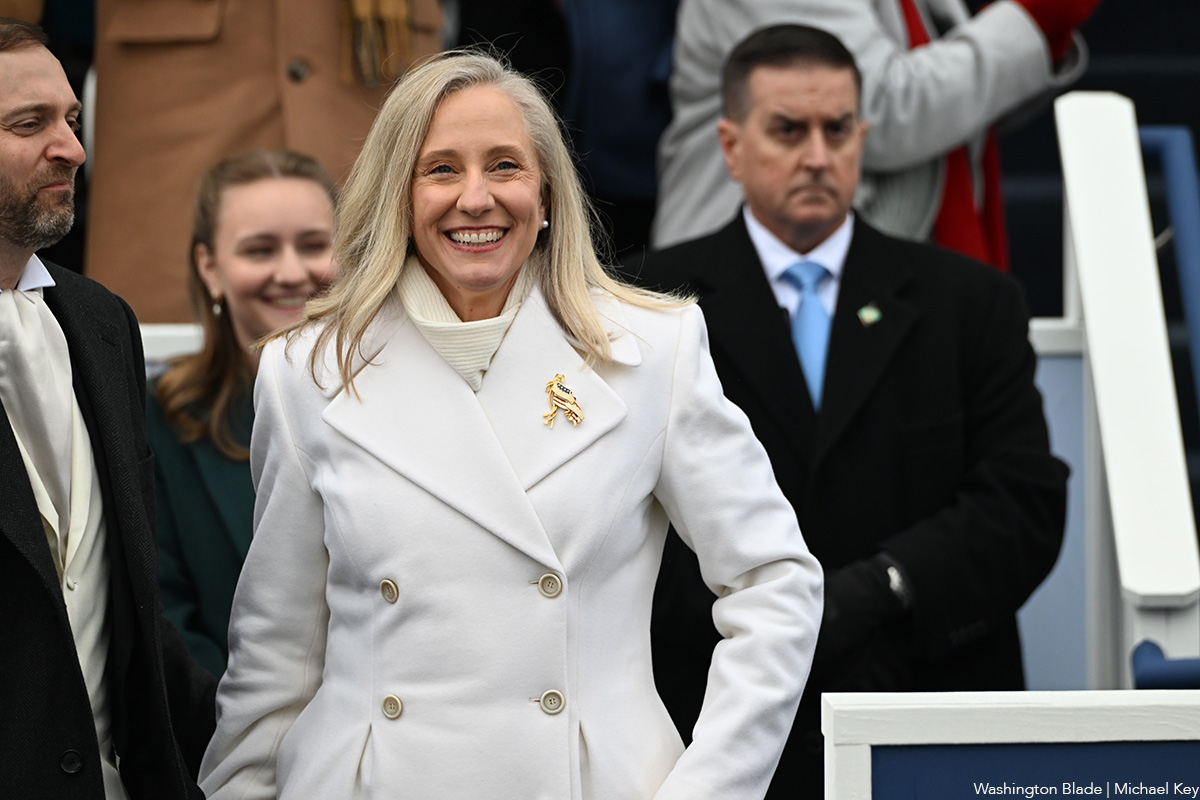Local
D.C. co-op guilty of anti-gay discrimination
Commission says board twice refused to allow gay couple to buy apartment


Thad Kemp (Photo courtesy of Kemp)
In a little noticed action, the D.C. Commission on Human Rights ruled last April that the president and board of directors of a cooperative apartment building on Connecticut Avenue violated the city’s Human Rights Act by twice refusing to allow a gay couple to buy an apartment.
The case is unusual because the commission’s decision came more than 15 years after Thad S. Kemp and his then partner William L. Houston filed a discrimination complaint with the city’s Office of Human Rights against 2101 Connecticut Avenue Cooperative Apartments, Inc.
The complaint charged the upscale building, located across the street from the Chinese Embassy, with using a series of pretexts to deny the couple’s application to buy an apartment in the building on two separate occasions in 1997 because of their sexual orientation and their status as a mixed race couple. Kemp is white and Houston is black.
The building has appealed the commission’s decision before the D.C. Court of Appeals, arguing, among other things, that the commission’s recommended decision was made by an administrative law judge who did not preside over a three-day hearing in which key witnesses testified.
Attorney Stephen Horvath, who is representing 2101 Connecticut Avenue Co-op, notes in an appeal brief that the original chief hearing examiner who presided over the case, Cornelius Alexander, died in 2007 before reaching a decision. Horvath argues the administrative law judge for the commission who handed down the decision, Dianne Harris, wasn’t present at the hearing to see the witnesses testify and assess their credibility.
Harris states in her recommended decision that she carefully read the transcript of all testimony viewed and studied the exhibits and documents entered into evidence and obtained a full and impartial picture of the case. She disputes claims by Horvath that past court rulings require that a hearing examiner or judge be present during testimony by witnesses in order to issue a ruling on a civil case.
Harris noted that while she was not present during testimony in the 2003 evidentiary hearing to determine whether the co-op board and its president, John Rodler, were liable for the alleged discrimination, she did preside over a separate hearing to assess what the damages and penalty for the co-op should be.
The commission’s final decision and order, handed down on April 23, 2012, shows that then commissioners Christopher Dyer and Nkechi Jaifa voted to approve Harris’s recommended decision that the co-op and Rodler engaged in discrimination based on sexual orientation and racial discrimination against Kempt and Houston.
The third commissioner assigned to the case, gay attorney Michael Ward, dissented from the majority, saying he agreed with the co-op’s attorney that Harris should not have ruled on the case without having personally attended the hearing in question.

Michael Ward of the D.C. Commission on Human Rights. (Washington Blade photo by Michael Key)
“Although I believe that there is adequate testimony from which the commission might infer liability, I believe that those inferences require assessment of credibility and that respondents cannot therefore be held liable absent a de novo [new] hearing at which the administrative law judge can make credibility determinations and propose a decision to the commission that reflects those determinations,” Ward wrote in his dissenting statement.
Dyer, the D.C. gay activist and former director of the Mayor’s office of GLBT Affairs, and Jaifa did not submit a statement explaining why they voted to approve Harris’s proposed decision.
Richard Salzman, the attorney representing Kemp and Houston, called the commission’s decision “fair and measured,” noting that it did not agree to all of the Kemp and Houston’s specific requests for damages. He noted that the commission denied Kemp’s request that the co-op pay him the amount of equity he would have accrued as the value of the two apartments he attempted to buy rose significantly in the 15 years since the co-op denied his application to buy the apartments.
“The evidence was overwhelming that the discrimination took place,” Salzman said. “It is clear to anyone who looks at the evidence presented.”
Under D.C. law, the D.C. Solicitor General, who is part of the Office of the D.C. Attorney General, is responsible for defending the Commission on Human Rights decision in the appeals court phase of the case.
A spokesperson for the Solicitor General said the office is scheduled to file its response to 2101 Connecticut Ave. Co-op’s appeal brief on Feb. 11.
In its April 23 decision, the D.C. Commission on Human Rights ordered the co-op to “cease and desist” from engaging in further discrimination against people who apply to buy an apartment in the building and who are covered under the D.C. Human Rights Act.
The decision also calls on the co-op building to pay Kemp $90,000 for the amount he paid ($515,000) for an apartment he bought in another building in excess of what he would have paid ($415,000) for one of the apartments he was prevented from buying in the co-op building.
In addition, the decision orders the co-op to pay Kemp $35,000 for “humiliation, embarrassment and indignity” he suffered due to the co-op’s discriminatory action against him. It calls for the co-op to award Houston $17,500 in damages for also suffering “humiliation, embarrassment and indignity.”
The co-op is also required to pay for Kemp and Houston’s attorney’s fees and to reimburse the city $6,458 in court reporting and transcription costs related to the case.
Why did this case take so long to go from the complaint to a decision by the commission?
David Simmons, chief administrative law judge for the Commission on Human Rights, told the Blade on Wednesday that one of the reasons Kemp and Houston’s discrimination case took 15 years to advance from the complaint to the commission’s decision last April was a lack of a sufficient number of hearing examiners and support staff for the commission.
He said more hearing examiners and support staff have been hired in recent years, but during the years that Alexander served as chief administrative law judge, the staffing was a “travesty,” he said. According to Simmons, at the time Alexander presided over the Kemp-Houston case, he was the only hearing examiner the commission had, forcing him to preside over all of the cases.
“I knew Cornelius Alexander, and he was hard-working and an excellent attorney,” he said. “In my view, the city killed him. They worked him to death.”
Virginia
Va. activists preparing campaign in support of repealing marriage amendment
Referendum about ‘dignity and equal protection under the law’

Virginia voters in November will vote on whether to repeal their state’s constitutional amendment that defines marriage as between a man and a woman.
Democratic Gov. Abigail Spanberger on Feb. 6 signed House Bill 612 into law. It facilitates a referendum for voters to approve the repeal of the 2006 Marshall-Newman Amendment. Although the U.S. Supreme Court’s Obergefell ruling extended marriage rights to same-sex couples across the country in 2014, codifying marriage equality in Virginia’s constitution would protect it in the state in case the decision is overturned.
Maryland voters in 2012 approved Question 6, which upheld the state’s marriage equality law, by a 52-48 percent margin. Same-sex marriage became legal in Maryland on Jan. 1, 2013.
LGBTQ advocacy groups and organizations that oppose marriage equality mounted political campaigns ahead of the referendum.

Equality Virginia has been involved in advancing LGBTQ rights in Virginia since 1989.
Equality Virginia is working under its 501c3 designation in conjunction with Equality Virginia Advocates, which operates under a 501c4 designation, to plan campaigns in support of repealing the Marshall-Newman Amendment.
The two main campaigns on which Equality Virginia will be focused are education and voter mobilization. Reed Williams, the group’s director of digital engagement and narrative, spoke with the Washington Blade about Equality Virginia’s plans ahead of the referendum.
Williams said an organization for a “statewide public education campaign” is currently underway. Williams told the Blade its goal will be “to ensure voters understand what this amendment does and why updating Virginia’s constitution matters for families across the commonwealth.”
The organization is also working on a “robust media and voter mobilization campaign to identify and turn out voters” to repeal Marshall-Newman Amendment. Equality Virginia plans to work with the community members to guarantee voters are getting clear and accurate information regarding the meaning of this vote and its effect on the Virginia LGBTQ community.
“We believe Virginia voters are ready to bring our constitution in line with both the law and the values of fairness and freedom that define our commonwealth,” said Equality Virginia Executive Director Narissa Rahaman. “This referendum is about ensuring loving, committed couples and their families are treated with dignity and equal protection under the law.”
The Human Rights Campaign has also worked closely with Equality Virginia.
“It’s time to get rid of outdated, unconstitutional language and ensure that same sex couples are protected in Virginia,” HRC President Kelley Robinson told the Blade in a statement.
District of Columbia
D.C. police arrest man for burglary at gay bar Spark Social House
Suspect ID’d from images captured by Spark Social House security cameras

D.C. police on Feb. 18 arrested a 63-year-old man “of no fixed address” for allegedly stealing cash from the registers at the gay bar Spark Social House after unlawfully entering the bar at 2009 14th St., N.W., around 12:04 a.m. after it had closed for business, according to a police incident report.
“Later that day officers canvassing for the suspect located him nearby,” a separate police statement says. “63-year-old Tony Jones of no fixed address was arrested and charged with Burglary II,” the statement says.
The police incident report states that the bar’s owner, Nick Tsusaki, told police investigators that the bar’s security cameras captured the image of a man who has frequently visited the bar and was believed to be homeless.
“Once inside, the defendant was observed via the establishment’s security cameras opening the cash register, removing U.S. currency, and placing the currency into the left front pocket of his jacket,” the report says.
Tsusaki told the Washington Blade that he and Spark’s employees have allowed Jones to enter the bar many times since it opened last year to use the bathroom in a gesture of compassion knowing he was homeless. Tsusaki said he is not aware of Jones ever having purchased anything during his visits.
According to Tsusaki, Spark closed for business at around 10:30 p.m. on the night of the incident at which time an employee did not properly lock the front entrance door. He said no employees or customers were present when the security cameras show Jones entering Spark through the front door around 12:04 a.m.
Tsusaki said the security camera images show Jones had been inside Spark for about three hours on the night of the burglary and show him taking cash out of two cash registers. He took a total of $300, Tsusaki said.
When Tsusaki and Spark employees arrived at the bar later in the day and discovered the cash was missing from the registers they immediately called police, Tsusaki told the Blade. Knowing that Jones often hung out along the 2000 block of 14th Street where Spark is located, Tsusaki said he went outside to look for him and saw him across the street and pointed Jones out to police, who then placed him under arrest.
A police arrest affidavit filed in court states that at the time they arrested him police found the stolen cash inside the pocket of the jacket Jones was wearing. It says after taking him into police custody officers found a powdered substance in a Ziploc bag also in Jones’s possession that tested positive for cocaine, resulting in him being charged with cocaine possession in addition to the burglary charge.
D.C. Superior Court records show a judge ordered Jones held in preventive detention at a Feb. 19 presentment hearing. The judge then scheduled a preliminary hearing for the case on Feb. 20, the outcome of which couldn’t immediately be obtained.
District of Columbia
Judge rescinds order against activist in Capital Pride lawsuit
Darren Pasha accused of stalking organization staff, board members, volunteers

A D.C. Superior Court judge on Feb.18 agreed to rescind his earlier ruling declaring local gay activist Darren Pasha in default for failing to attend a virtual court hearing regarding an anti-stalking lawsuit brought against him by the Capital Pride Alliance, the group that organizes D.C.’s annual Pride events.
The Capital Pride lawsuit, initially filed on Oct. 27, 2025, accuses Pasha of engaging in a year-long “course of conduct” of “harassment, intimidation, threats, manipulation, and coercive behavior” targeting Capital Pride staff, board members, and volunteers.
In his own court filings without retaining an attorney, Pasha has strongly denied the stalking related allegations against him, saying “no credible or admissible evidence has been provided” to show he engaged in any wrongdoing.
Judge Robert D. Okum nevertheless on Feb. 6 approved a temporary stay-away order requiring Pasha to stay at least 100 feet away from Capital Pride’s staff, volunteers, and board members until the time of a follow-up court hearing scheduled for April 17. He reduced the stay-away distance from 200 yards as requested by Capital Pride.
In his two-page order issued on Feb. 18, Okun stated that Pasha explained that he was involved in a scooter accident in which he was injured and his phone was damaged, preventing him from joining the Feb. 6 court hearing.
“Therefore, the court finds there is a good cause for vacating the default,” Okun states in his order.
At the time he initially approved the default order at the Feb. 6 hearing that Pasha didn’t attend, Okun scheduled an April 17 ex parte proof hearing in which Capital Pride could have requested a ruling in its favor seeking a permanent anti-stalking order against Pasha.
In his Feb. 18 ruling rescinding the default order Okun changed the April 17 ex parte proof hearing to an initial scheduling conference hearing in which a decision on the outcome of the case is not likely to happen.
In addition, he agreed to consider Pasha’s call for a jury trial and gave Capital Pride 14 days to contest that request. The Capital Pride lawsuit initially called for a non-jury trial by judge.
One request by Pasha that Okum denied was a call for him to order Capital Pride to stop its staff or volunteers from posting information about the lawsuit on social media. Pasha has said the D.C.-based online blog called DC Homos, which Pasha claims is operated by someone associated with Capital Pride, has been posting articles portraying him in a negative light and subjecting him to highly negative publicity.
“The defendant has not set forth a sufficient basis for the court to restrict the plaintiff’s social media postings, and the court therefore will deny the defendant’s request in his social media praecipe,” Okun states in his order.
A praecipe is a formal written document requesting action by a court.
Pasha called the order a positive development in his favor. He said he plans to file another motion with more information about what he calls the unfair and defamatory reports about him related to the lawsuit by DC Homos, with a call for the judge to reverse his decision not to order Capital Pride to stop social media postings about the lawsuit.
Pasha points to a video interview on the LGBTQ Team Rayceen broadcast, a link to which he sent to the Washington Blade, in which DC Homos operator Jose Romero acknowledged his association with Capital Pride Alliance.
Capital Pride Executive Director Ryan Bos didn’t immediately respond to a message from the Blade asking whether Romero was a volunteer or employee with Capital Pride.
Pasha also said he believes the latest order has the effect of rescinding the temporary stay away order against him approved by Okun in his earlier ruling, even though Okun makes no mention of the stay away order in his latest ruling. Capital Pride attorney Nick Harrison told the Blade the stay away order “remains in full force and effect.”
Harrison said Capital Pride has no further comment on the lawsuit.


















